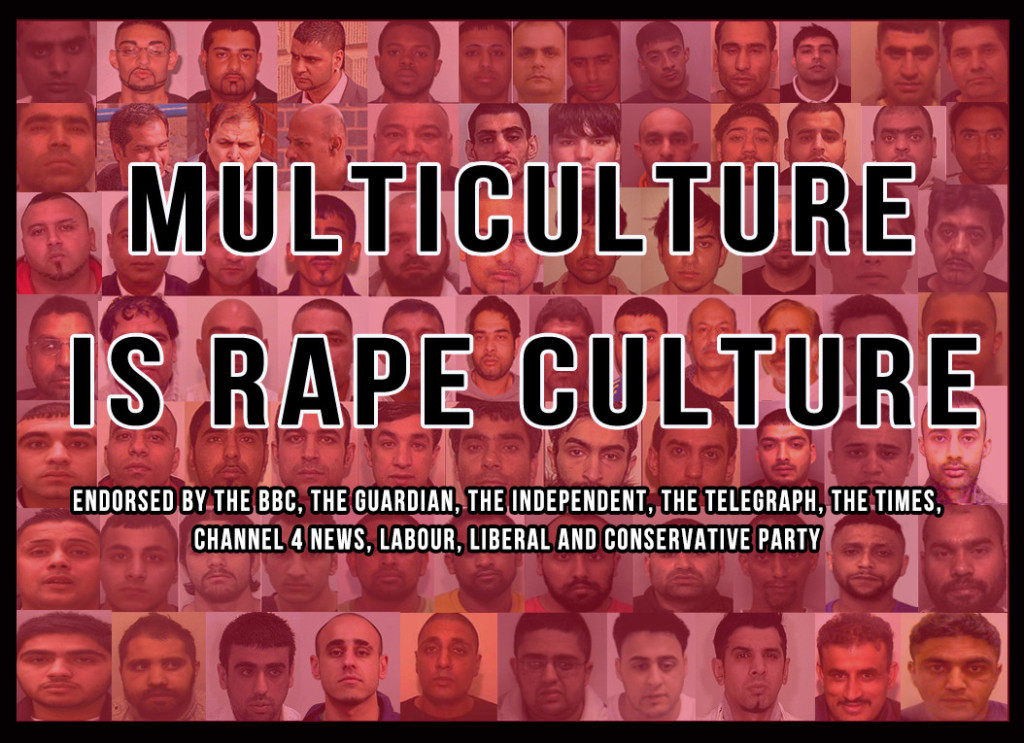Diversity Macht Frei
September 5, 2014

The Guardian has continued its long disgraceful tradition of coverage on the issue of the mass rape of British children by Muslim gangs. The paper suppressed any discussion of the issue for as long as it could get away with it. When it broke elsewhere, and the Guardian was forced to engage with it, it did everything possible to extenuate it. Here we have more of the same in an interview with Nazir Afzal, “the Crown Prosecution Service’s lead on child sexual abuse and violence against women and girls”, usually presented as the “good Paki”. It’s worth asking why a Paki has been appointed to a position as important as this when Pakis appear so disproportionately among the ranks of the perpetrators.
It’s not about Islam, he says.
In the aftermath of the Rochdale trial, Afzal was disturbed at the way that some responded by muddling the actions of those prosecuted with their religious backgrounds. “There is a lot of criticism of religion – namely: ‘Is this a Muslim thing?’” He recalls how after the Rochdale case, someone called the Radio 4 Any Answers programme. “He said the Qu’ran supports paedophilia. I’m not paraphrasing, that is what he said. He wasn’t cut off, he was allowed to say all manner of things.”
“There is no religious basis for this. These men were not religious. Islam says that alcohol, drugs, rape and abuse are all forbidden, yet these men were surrounded by all of these things. So how can anyone say that these men were driven by their religion to do this kind of thing?
“They were doing this horrible, terrible stuff, because of the fact that they are men. That’s sadly what the driver is here. This is about male power. These young girls have been manipulated and abused because they were easy prey for evil men.”
Source: Guardian
It’s about the ‘night-time economy’.
Where there is involvement of Asian men or men of Pakistani origin, he points to a practical, rather than cultural explanation – the fact that in the areas where grooming scandals have been uncovered, those controlling the night-time economy, people working through the night in takeaways and driving minicabs, are predominantly Asian men. He argues that evidence suggests that victims were not targeted because they were white but because they were vulnerable and their vulnerability caused them to seek out “warmth, love, transport, mind-numbing substances, drugs, alcohol and food”.
“Who offers those things? In certain parts of the country, the place they go is the night-time economy,” he says. “Where you have Pakistani men, Asian men, disproportionately employed in the night-time economy, they are going to be more involved in this kind of activity than perhaps white men are. We keep hearing people talk about a problem in the north and the Midlands, and that’s where you have lots of minicab drivers, lots of people employed in takeaways, from that kind of background. If you have a preponderance of Asians working in those fields, some of that number, a very small number of those people, will take advantage of the girls who have moved into their sphere of influence. It’s tragic.”
Dan “Searchlight” Hodges has actually written a decent response to this. Has this been a “wake-up” moment for him? Has the Searchlighter finally seen the light?
 Daily Stormer The Most Censored Publication in History
Daily Stormer The Most Censored Publication in History


